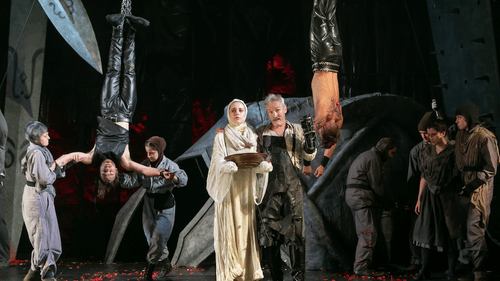Stay in the Loop
BSR publishes on a weekly schedule, with an email newsletter every Wednesday and Thursday morning. There’s no paywall, and subscribing is always free.
Rome runs red with blood
Shakespeare Theatre of New Jersey presents 'Titus Andronicus'

Shakespeare wrote Titus Andronicus early in his career, but it can feel easily feel more problematic than the suite of late-in-life works that scholars have deemed “problem plays.” Brian B. Crowe’s visually stunning, entertainingly acted production for Shakespeare Theatre of New Jersey doesn’t shrink from the bloody drama’s questionable nature, but it doesn’t entirely resolve the plot’s thornier issues, either.
When people think of Titus, they think of carnage. And with good reason: the play includes filicide, pillaging, rape, assassination, and cannibalism. The drama sometimes veers in directions Quentin Tarantino wouldn’t touch, which testifies to the common taste for violence among the Elizabethan theatergoing public.
Putting such sanguine deeds across convincingly requires a stylized vision that stops short of cliché or camp. Here, Crowe mostly delivers. Actual blood is never spilled onstage; when a character dies, red and white ribbons of confetti strew the stage.
The effect works wonderfully, as the paper virtually colonizes the playing area, furiously swept away by costumed stagehands only to make room for more. The visual trick communicates the ever-present danger that pervaded the Roman republic.
Like many tragic heroes, Titus is undone by his sense of duty and honor. A military mastermind and loyal subject, he declines Rome’s emperorship, ceding it to the man he views as its rightful heir: Saturninus, son of the late leader. All hell breaks loose when Lavinia, Titus’s daughter, rejects the new ruler’s marriage proposal, preferring his brother Bassianus instead.
Bloody good time
Here, the play becomes part soap opera, part snuff film. Saturninus instead takes Tamora, a Goth queen imprisoned during a Roman conquest, as his wife. Tamora plans to use her position to avenge the death of her son and the plundering of her people, all while playing the noble consort in public. Meanwhile, the indignities Titus faces set his heart toward revenge.
Titus Andronicus can be a rip-roaring good time at its best, with wry, witty dialogue and humorously outsized emotion. The story has duplicity and deviousness to spare, and unlike other works in Shakespeare’s canon, there’s little ambiguity as to who’s good and who’s wicked. These performances largely communicate the play’s moral undertones, with particularly good work from Bruce Cromer (an honorable, passionate Titus) and Robert Cuccioli (Titus’s politically minded brother, Marcus Andronicus).

The play also contains elements that have not aged well, notably its views of women and racial issues. Lavinia’s rape and mutilation by Tamora’s sons feels shocking even by today’s standards. Crowe keeps the worst of the action offstage, but it remains disturbing, particularly when actor Fiona Robberson returns shrouded in white, her hands reduced to bleeding stumps. Even more disturbing is the suggestion, late in the play, that a raped woman carries such dishonor she’s better off dead.
Tamora can come across as a standard-issue villain, and she’s certainly played that way by Vanessa Morosco, decked out in a mile-high red wig and gladiatorial leather dress (costumes by Yao Chen, hair design by Samantha LaScala). But one must remember she is also a captive, ripped from her position of power, and likely was also raped and tortured. She uses her position as empress to her own diabolical advantage, yet her victimhood shouldn’t be entirely eclipsed.
The treatment of Aaron, Tamora’s Moorish lover, also sits uncomfortably today. Here, when Titus’s men threaten to kill him, a noose drops from the ceiling, evoking the legacy of lynching. Aaron is not an innocent character, but he endures a constant barrage of humiliation — including questions about his intelligence and very right to life — due to the color of his skin. Chris White’s excellent performance considers these elements, creating a man who feels less resolutely evil and more weighted down by his outsider status.
Playing up Aaron’s otherness and its effect on his misdeeds is a smart directorial choice, and I’d welcome a production that treats Tamora with similar nuance. But I remain unconvinced that any director can solve all the play’s problems. Crowe’s Titus, aided by a fine cast, offers a bloody good time and more than a few opportunities to think.
What, When, Where
Titus Andronicus. By William Shakespeare, Brian B. Crowe directed. Shakespeare Theatre of New Jersey. Through August 5, 2018, at the F.M. Kirby Shakespeare Theatre, 36 Madison Avenue, Madison, New Jersey. (973) 408-5600 or shakespearenj.org.
Sign up for our newsletter
All of the week's new articles, all in one place. Sign up for the free weekly BSR newsletters, and don't miss a conversation.

 Cameron Kelsall
Cameron Kelsall